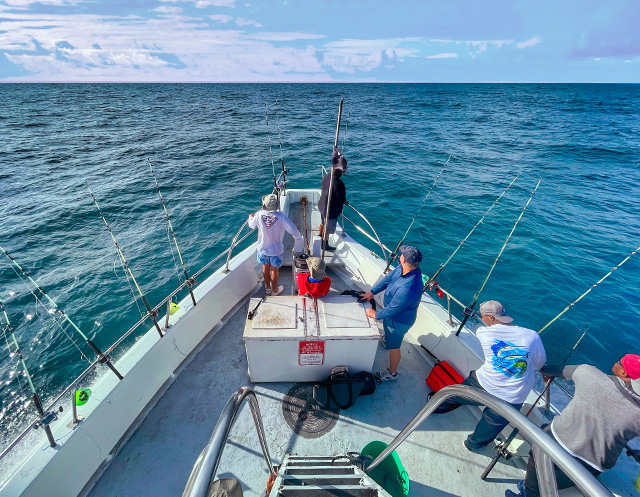Competitive offshore fishing is more than just a sport; it's a thrilling adventure that combines skill, strategy, and a deep love for the ocean. For those who participate, it offers the adrenaline rush of the chase, the satisfaction of the catch, and the camaraderie of sharing the experience with fellow anglers. Dive into the exciting world of competitive offshore fishing, exploring its history, the basics of tournaments, essential gear, preparation strategies, and the culture surrounding this fascinating sport.
 spear fishing
spear fishingThe History of Competitive Offshore Fishing
The origins of competitive offshore fishing date back to the early 20th century when anglers sought to test their skills against some of the ocean's most formidable creatures. The sport gained popularity with the advent of tournaments that celebrated the biggest catches and the best techniques. Notable early events like the International Tuna Cup Match in 1937 and the Cat Cay Tuna Tournament in 1939 set the stage for what would become a global phenomenon. Over the years, the sport has grown, attracting participants from around the world and evolving into a highly competitive and specialized field.
The Basics of Offshore Fishing Tournaments
Offshore fishing tournaments come in various forms, often categorized by the species targeted, such as marlin, tuna, wahoo, or mahi. These events are governed by a set of rules and regulations designed to ensure fairness and safety. A common aspect of these tournaments is the scoring system, which may be based on the weight of the fish or a catch-and-release format, where points are awarded for releasing fish after they are caught. Prizes can range from cash awards to trophies, and the prestige of winning a renowned tournament is highly coveted among anglers.
The Essential Gear and Equipment
Success in competitive offshore fishing requires specialized equipment. The choice of gear depends largely on the targeted species and the fishing techniques employed. Essential items include high-quality rods and reels, a variety of lures, and a capable boat stocked with essential boating supplies. In recent years, technological advancements like sonar and GPS have become integral to locating fish and navigating the open waters. Boats used in these competitions are often equipped with state-of-the-art electronics and communication tools to enhance performance and safety.
The Preparation and Strategy
Preparation is a critical component of competitive offshore fishing. Teams spend considerable time ensuring their equipment is in top condition, monitoring weather patterns, and developing a strategic plan. This includes selecting potential fishing spots, understanding the behavior of target species, and timing the fishing efforts. Effective communication and teamwork are crucial, as successful fishing often hinges on quick decision-making and coordinated actions.
The Experience on the Water
A day in the life of a competitive offshore fishing team is filled with excitement and unpredictability. From the early morning hours, teams set out to their chosen fishing grounds, often navigating challenging weather and sea conditions. The thrill of spotting a school of fish or hooking a large catch is unparalleled, but so are the challenges, such as dealing with gear malfunctions or battling the elements. The camaraderie among team members and the shared joy of a successful catch create lasting memories and a deep bond.
Notable Tournaments and Events
There are numerous prestigious offshore fishing tournaments around the world, each offering its unique challenges and rewards. Events like The Big Rock Blue Marlin Tournament held in Morehead City, North Carolina and Bisbee’s Black & Blue held in Cabo San Lucas are renowned for their competitive spirit and impressive prizes. These tournaments have seen record-breaking catches and unforgettable moments, often becoming the stuff of legend within the angling community. Many anglers aspire to participate in these events, aiming to leave their mark in the history of the sport.
The Community and Culture
Competitive offshore fishing fosters a strong sense of community among participants. The shared passion for the sport brings together people from diverse backgrounds, united by their love for the ocean and the thrill of fishing. Ethical considerations and conservation efforts play a significant role in this community, with many tournaments emphasizing sustainable practices and catch-and-release policies. The economic impact of these events is also notable, providing a boost to local economies and supporting coastal communities.
The Future of Competitive Offshore Fishing
As technology continues to advance, the future of competitive offshore fishing looks promising. Innovations in fishing gear and navigation systems are likely to enhance the efficiency and safety of the sport. However, the importance of conservation and sustainable fishing practices remains paramount. As more people become aware of the environmental impact of fishing, the sport may see a shift towards more eco-friendly practices and greater emphasis on protecting marine life.
Appreciation for the Ocean and the Sport
Competitive offshore fishing is a captivating sport that offers excitement, challenge, and a deep connection to the ocean. Whether you're an experienced angler or a newcomer, there's something uniquely rewarding about participating in these tournaments. As the sport continues to evolve, it remains a testament to the skill, perseverance, and passion of those who love the sea.


 Current Events
Current Events